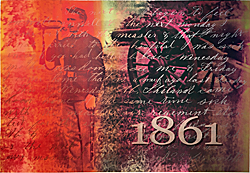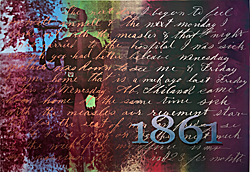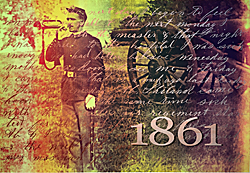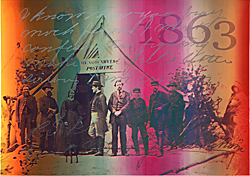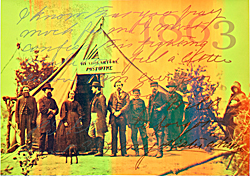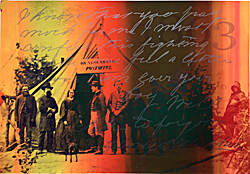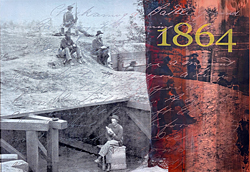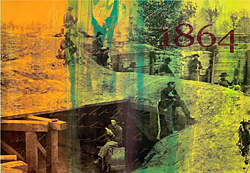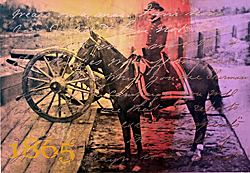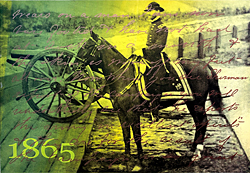The American Civil War Quintet
Five portfolios, one for each year of the American Civil War, 1861-1865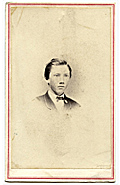
By Dana Smith
This work is inspired by primary source documents in the form of 150 letters written by the artist's great-great grandfather, William Garret Fisher, while fighting the American Civil War for the Union. Here, to the right of this text, is a photo of William Garret Fisher, probably taken around the time that he dropped out of school to volunteer to fight for what he thought would be a short stint, but became a 5 year saga, as detailed in his letters home.
Each of the five portfolios contains a number of silkscreen prints that combine the graphic beauty of the handwritten letters with photos from the Library of Congress Civil War archive that seem to illustrate Will’s narrative. The silkscreens, made using a technique that makes each print unique, akin to a monotype, are accompanied by digital prints to document the specific letter that relates to the silkscreen. 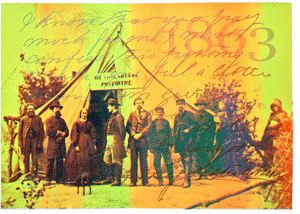
The result of a painter’s approach to silkscreen is a wildly variant edition - each print is similar to the rest, yet different in color and mood. The process of printing used three layers or screens. The first layer of ink was applied using a painterly technique designed to create bands of color and random shapes that depict a horizon in time where memory appears and disappears, and where the ghosts of history sometimes reveal themselves or retreat in darkness. This abstract background speaks to an emotional part of the viewer and poses the question, "What might this be?" The second layer is a half-toned photographic image selected from the Library of Congress archive of Civil War photos chosen because it seems to illustrate something mentioned in Will's letters. Each photo shows a moment in time from the years 1861-1865, where the soldiers, the generals, the postal workers, the wounded, the gravediggers, the washer woman, even children and animals, all are making eye contact across the generations. The third layer shows the beauty of the handwriting scanned from Will's letters and is applied in semi-transparent metallic ink to float above the image, shimmering in and out with the shift in angle of the viewer.
1861by Dana Smith, 2022A variable edition of sets of 7 silkscreen prints on Stonehenge paper, accompanied by 7 digital prints on Moab Entrada paper, 30x22 inches. |
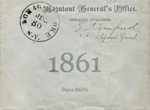 |
| This portfolio is in the following collections: • University of California at Irvine • University of Connecticut, in Storrs, CT • University of Delaware, in Newark, DE • School of the Museum of Fine Arts at Tufts University, Boston, MA • Stanford University, Palo Alto, CA • Library of Congress, Washington, DC |
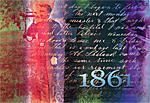 |
1862by Dana Smith, 2023A variable edition of sets of 6 silkscreen prints on Stonehenge paper, accompanied by 6 digital prints on Moab Entrada paper, 30x22 inches. |
 |
This portfolio is in the following collections: |
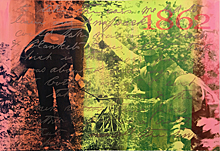 |
1863by Dana Smith, 2021A variable edition of sets of 5 silkscreen prints on Stonehenge paper, accompanied by 5 digital prints on Moab Entrada paper, 30x22 inches. |
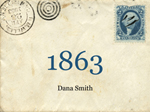 |
| This portfolio is in the following collections: • Letterform Archive in San Francisco, CA • University of California at Santa Barbara • University of Connecticut, in Storrs, CT • University of Delaware, in Newark, DE • School of the Museum of Fine Arts at Tufts University, Boston, MA • Stanford University, Palo Alto, CA • Library of Congress, Washington, DC |
 |
1864by Dana Smith, 2024A variable edition of sets of 6 silkscreen prints on Stonehenge paper, accompanied by 6 digital prints on Moab Entrada paper, 30x22 inches. |
 |
This portfolio is in the following collections: |
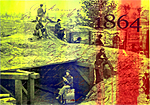 |
1865by Dana Smith, 2025A variable edition of sets of 5 silkscreen prints on Stonehenge paper, accompanied by 5 digital prints on Moab Entrada paper, 30x22 inches. |
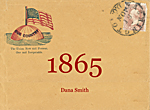 |
This portfolio is in the following collections: |
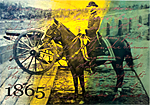 |
More about William Garret Fisher
William Garret Fisher’s letters home while fighting the American Civil War are a collection of 150 letters preserved by his family. Will Fisher joined the Union Army on September 30, 1861, as a bugler in Company A, 7th Regiment of New York Cavalry Volunteers also known as J. Morrison’s Black Horse Cavalry. When this Regiment was mustered out of service six months later on August 7, 1862, Will re-enlisted as an infantry private in the 123rd Regiment, New York Volunteers. He served with that Regiment throughout the remainder of the war. All of Will Fisher’s letters are archived at www.willfisher.org.
Will Fisher’s letters were handed down to the artist from her great-great-grandfather through her mother, Judith Fuller Smith. Judith assisted her father, Pierpont Fuller in the tedious job of transcribing the original handwritten letters. Scanned images of the letters are seen on the right side of all the digital prints in the sets, with the transcribed text on the left. At the top right of this web page, is a photo of William Garret Fisher, probably taken around the time that he dropped out of school to volunteer, with his mother’s permission, to fight for what he thought would be a short stint, but became a 5 year saga, as detailed in his letters home.So, it is clear that these primary source documents of Will’s eye-witness accounts of some of the most traumatic episodes in the history of the United States speak directly to the artist personally. It is her aim, and perhaps her ancestral responsibility, to re-construct and illustrate the troubled legacy of this epigenetic heritage.

